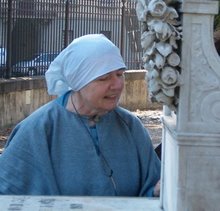FALSE ECONOMIES AND TRUE
John Kenneth Galbraith, in The Age of Uncertainty, said the way bankers make money is obscene. A true economy is a reciprocity of needs shared and matched. Better than a bank account is a skill, knowing how to build a house, knowing how to tend the land. Today we have become addicted to debt, to food, the consequences being bankruptcy, obesity. We are dependent on cash crops, again through deliberately planned addictions, such as to coffee and to drugs. All these cripple us, rob us of freedom, of happiness, though they seem to offer these enticingly, seductively.
Our education has robbed us of the skills our parents could have taught, how to build a dry wall to terrace land, how to sew with needle and thread, by telling us to despise the work of human hands, once the work of our parents, now the work done in the Third World by underpaid child labour. All this cripples us. Our young people, cheated of the well-paid desk job they were expected to get, today graffiti the walls of Florence with rage, making loveliness ugly.
In Italy, until Berlusconi, savings banks were required by law to use some of their obscene profits for cultural and charitable projects. These laws in the Middle Ages and Renaissance created Florence, before the 'Robber Baron' Medici were even heard of. The Guelf medieval city walls were built out of the stones of the Ghibelline 'towers of pride', the hospital of Santa Maria Nuova, the ambulance and burial service of the Misericordia, the caring for and education of unwanted babies at the Ospedale degli Innocenti, Orsanmichele as a granary to feed even the enemy in time of famine, the caring for the proud poor by the Buonomini di San Martino, as well as the great cathedral and the Palazzo del Popolo (now the Palazzo Vecchio), setting in place a great network of social services in which the citizens themselves participated with their work and their money, their creativity, their energy. These civic laws and organizations worked for the common prosperity of all, their health, their education. No longer.
In the year 2000 we talked of forgiving debts to the Third World, realizing our banks were increasing poverty wherever they made loans to poorer nations who could not afford to pay. So banks turned upon their own citizens, foreclosing their homes with toxic mortgages, shutting down or moving businesses to 'outsource' them, to use the underpaid labour of the Third World, instead of the justly paid labour of the First, thus internalizing the Third World's poverty upon the First World.
We are back in the period of 'cool' Calvin Coolidge and the Robber Baron architecture of Washington, D.C., where the rich get richer and the poor get children in broken homes. The change could come with using the thinking of John Kenneth Galbraith and Franklin Delano Roosevelt, investing in the people, in building the future.
We need to change education holistically, to value the skills fathers and mothers can teach children, to emphasize the work of the body, the mind, and the soul, using the work, study and prayer, of the medieval monastery, not that of the Greco-Arabic university's intellectuality alone. I value being taught during WWII by my foster father how to be a carpenter, which I have taught in turn to my children. My educated parents were writing speeches for Czechoslovakia's President in exile and listening to enemy broadcasts at Evesham. They didn't know how to build the bookcases for their many books. I do. My sons do. My grandchildren do. We know from this, too, how to build solar homes.
We need to change banking, to require banks to devote a handsome part of their obscene profits to providing health care, libraries, rehabilitation centres, museums, skills preserving and training centres. If they do this there will not be global bankruptcy.
We need to have nurturing families where new-born babies are loved, not abandoned with toys and machines, but instead held, rocked, sung to. In such a way we will not have dysfunctional adults addicted to war, drugs, debt, but instead people valued for their contributions in hand work, brain work, caring work, people whole in body, mind and soul, debt free.
Give us this day our daily earned bread
And forgive us our debts
As we forgive those in debt to us.
Amen.
Saturday, August 06, 2011
Subscribe to:
Posts (Atom)

